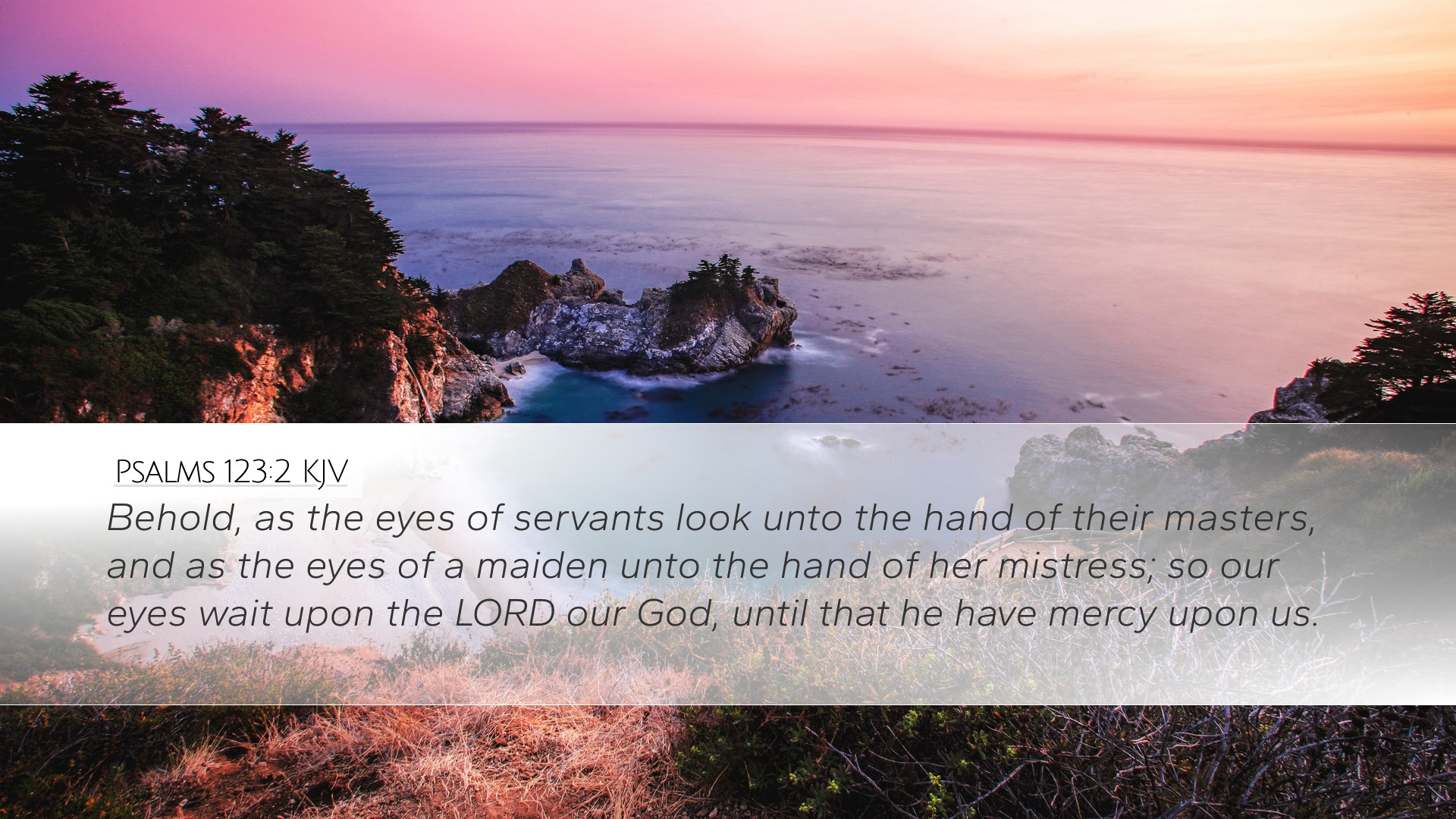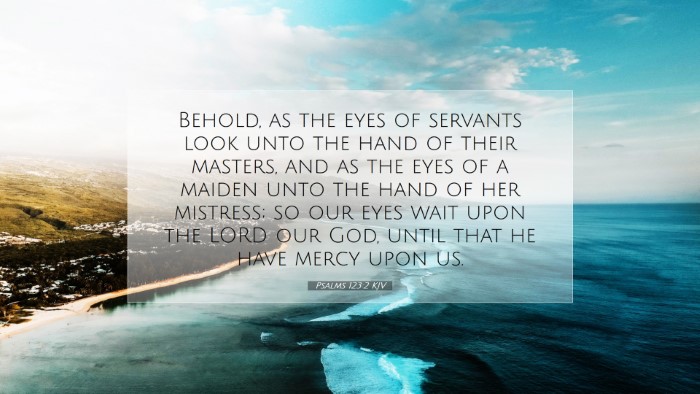Psalms 123:2 Commentary
Verse (Psalm 123:2, ESV): "Behold, as the eyes of servants look to the hand of their master, as the eyes of a maidservant to the hand of her mistress, so our eyes look to the Lord our God, till he has mercy upon us."
Introduction
The Psalms are a profound collection of songs, prayers, and meditations, expressing the full range of human emotion towards God. Psalm 123 is a Song of Ascents, suggesting it was sung by pilgrims on their way to worship in Jerusalem. This particular verse underscores a posture of dependence and expectation that is central to the life of faith.
Exegesis and Analysis
This verse employs a metaphorical framework contrasting human servitude with divine expectation. The imagery of servants looking intently at their masters is significant, highlighting a relationship that is characterized by respect, trust, and reliance.
1. The Nature of Servitude
Matthew Henry notes that just as servants are attentive to their masters' gestures, so should believers remain attentive to God's will and grace. The meticulous observation of a servant's actions reflects a deep-seated trust in their master's ability to provide and protect.
- Trust Established: This dynamic emphasizes the need for believers to trust in God’s provision and timing.
- Expectation of Mercy: The psalmist articulates a longing for divine intervention, which speaks to the nature of dependence on God.
2. The Posture of Waiting
Albert Barnes highlights that waiting upon God is an active, disciplined posture that demands patience. The phrase “until he has mercy upon us” indicates that there is an anticipated fulfillment of God’s promise. This waiting signifies faith in God’s perfect timing.
- Faith in Action: The act of waiting indicates a relational aspect between the servant and the master, where one's expectation is grounded in the characterization of the master as merciful.
- Collective Experience: The psalmist speaks not only for himself but of the collective experience of Israel as a people waiting for God’s deliverance.
3. Divine Perspective
Adam Clarke points out that the imagery of the eyes reflects an intense focus on the master. This metaphor illustrates believers’ spiritual gaze upon God, suggesting a yearning not just for mercy but for a deeper relationship with Him. There is an indication that through suffering and trials, God’s mercy will ultimately shine through.
- God’s Sovereignty: This verse places God as the sovereign benefactor, while believers are positioned as humble recipients, emphasizing God’s power and authority.
- Anticipation of Deliverance: The phrase urges believers to hold fast to the hope of redemption and mercy, reinforcing the theological concept of God’s ultimate deliverance through faith.
Theological Implications
Psalm 123:2 can be significant for contemporary believers and theologians for several reasons:
- Prayer and Humility: The verse encourages a posture of humility in prayer—a theme echoed throughout scripture, where God delights in those who recognize their dependence on Him.
- Communal Aspect: The communal nature of waiting upon God reminds congregations that they are part of a larger narrative wherein corporate faith is crucial.
- Expectation of Grace: The inherent expectation of mercy speaks to God’s character and the hope believers ought to cultivate even in moments of despair.
Application for Life and Ministry
Pastors, students, and theologians can draw from this text for impactful engagement in ministry and personal spiritual development:
- Encouragement in Waiting: Leaders can provide encouragement to congregants struggling with waiting on God, assuring them that God’s mercy is forthcoming.
- Teaching on Dependency: Bible studies can be framed around the themes of dependency on God, illustrated through prayer practices that promote listening for God’s direction and grace.
- Building Community: Fostering a culture of corporate waiting and intercessory prayer within communities can reflect the relational aspect highlighted in the psalm.
Conclusion
Psalm 123:2 beautifully captures the essence of the believer's relationship with God—a relationship built upon trust, expectation, and mercy. By understanding the intricacies of this verse, believers can cultivate a deeper reliance on the Lord, encouraging an active faith that anticipates His divine intervention. In times of trial and uncertainty, let us remember to look to our God with the same diligence as a servant looks to their master, waiting until His mercy is revealed.


